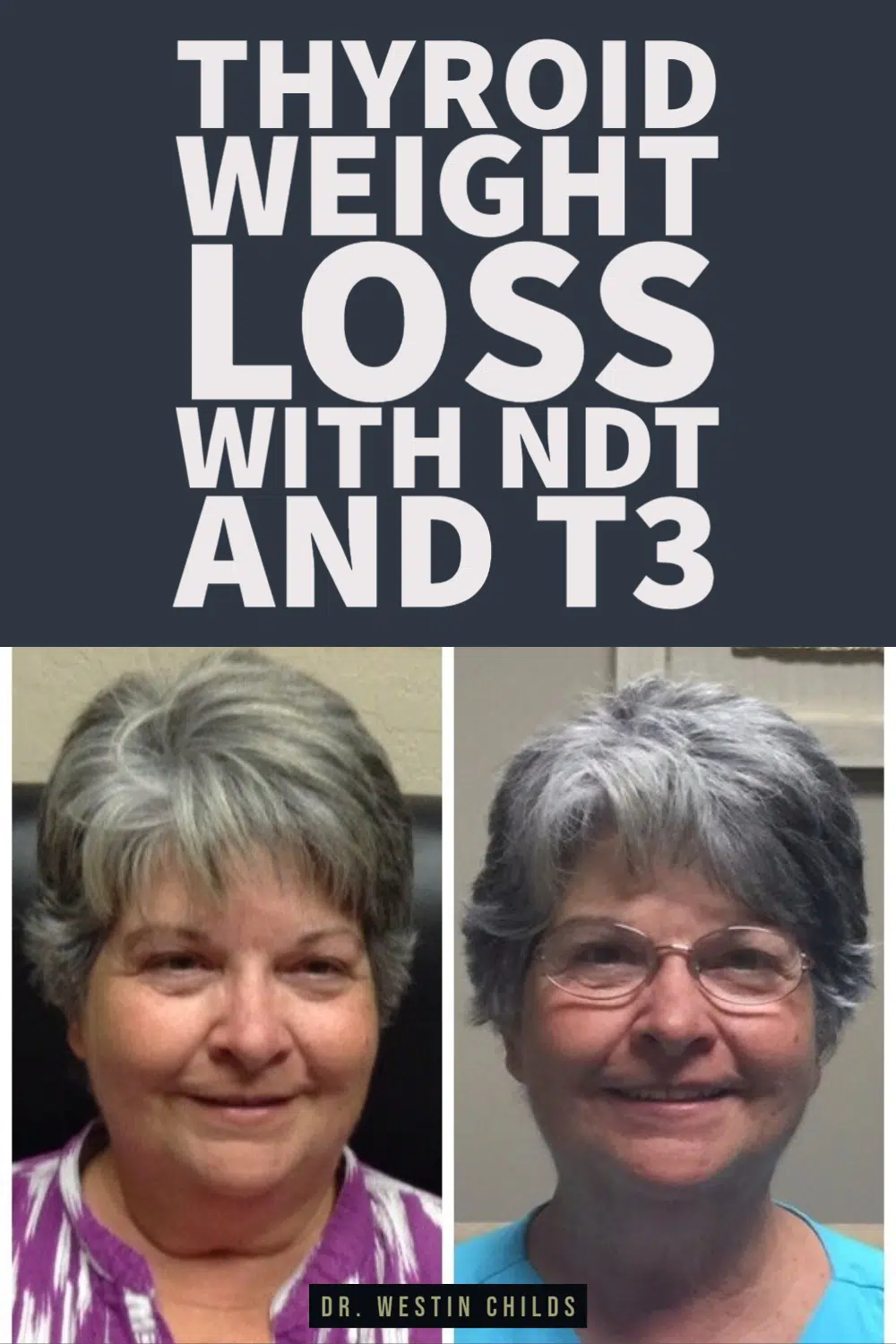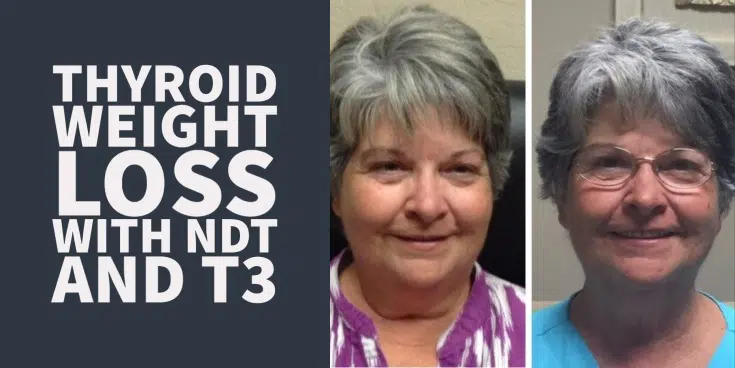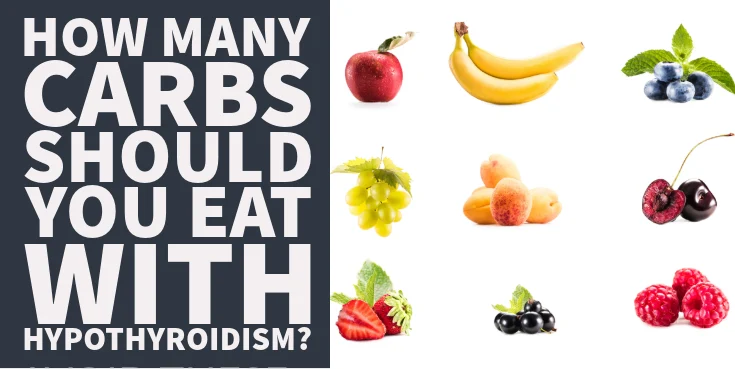Once Kathy had the right diagnosis and treatment plan in place she was able to lose 42 pounds in a matter of months…
But the real question is:
Why did it take her 5+ doctors to find and treat her and what does it take to help thyroid patients lose this kind of weight?
The answer might surprise you.
Most of the time it isn’t thyroid issues holding back thyroid patients from losing weight.
This is important so I will repeat it.
If you are a hypothyroid patient and you can’t lose weight, the reason is most likely related to some other hormone problem – NOT your thyroid.
I’m going to explain why throughout this post but for a second let’s jump back to Kathy.
By the way, here is a before and after picture of Kathy (42 pounds and 3 months later)…
As you go through this post I want you to ask yourself this question:
Is her story similar to yours?
DOWNLOAD FREE RESOURCES
Foods to Avoid if you Have Thyroid Problems:
I’ve found that these 10 foods cause the most problems for thyroid patients. Learn which foods you should avoid if you have thyroid disease of any type.
The Complete List of Thyroid Lab tests:
The list includes optimal ranges, normal ranges, and the complete list of tests you need to diagnose and manage thyroid disease correctly!
Why Doctors Ignore the Problem and Why you can’t Lose Weight
If you want to get a similar treatment as this case study you can get my 60-day weight loss guide which is included in my weight loss supplement bundle.
One of the biggest problems I see facing thyroid patients is weight loss resistance.
They attempt to tackle this problem with repeated bouts of eating less and exercising more.
There’s just one big problem with this approach:
It doesn’t work and it can damage your thyroid in the process.
This type of dieting may lead to some weight loss in your 20s and 30s, but will almost always result in significant damage to your metabolism and guarantee a very unpleasant 40s-50s with weight gain and weight loss resistance.
Cutting your calories (and exercising more) leads to metabolic damage and numerous hormonal changes that lead to weight gain (1).
If you are truly interested in losing weight then balancing your hormones, not your calories, is the answer to your problem.
But what does every doctor tell you if you tell them you want to lose weight and you have thyroid problems?
First – If you want to lose weight you need to eat less and exercise more
Second – They either think you are lying to them about your diet, or they try to put you on anti-depressants.
Does this sound familiar?
Instead of focusing on how much you eat or how much you exercise, you should be focusing on the following hormones: Thyroid hormone, Insulin, and Leptin.
These 3 hormones contribute to the majority of weight gain and weight loss resistance in most patients that I see and treat on a daily basis.
Yes, testosterone, estrogen/progesterone, and cortisol play a role – but they are usually secondary to the big three listed above.
This is why it becomes so important to shift your focus away from diet, calories, and food and toward hormone balance.
But, when was the last time your doctor talked about ordering these tests?
When was the last time that your doctor mentioned that these hormones can lead to weight issues?
My guess is probably never – and that is the problem. At the end of this article, you can find some resources to help you find a doctor willing to work with you.
But for now, let’s use Kathy (and her labs) as an example of how and what you should be focusing on…
Getting the Diagnosis Right
Now, I should take a minute to break down a few things for you before we get into her labs:
First – ordering the right labs is only just the beginning of your treatment.
If you go to your doctor with a list of labs that I am recommending you are likely to be met with frustration.
Why?
Because if your doctor knew about these hormones and tests then they would have ordered them to begin with.
Most of the time asking for a bunch of tests the doctor isn’t comfortable interpreting will be met with a big old “your labs are normal”.
That’s why I want to break these down for you step by step so you understand the big difference between “optimal” and “normal”.
So let’s take a look at Kathy’s thyroid lab tests:

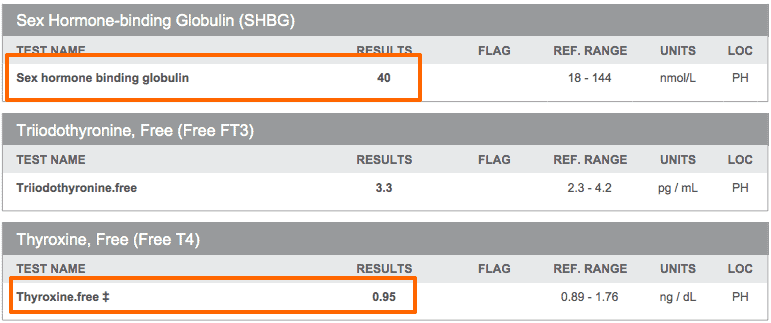
As you can see they all fall within the “normal range”, but are they really optimal?
Her TSH is 3.323 with a reference range of 0.35 to 5.5. If you read the blog post I linked above then you will know that an optimal TSH is usually less than 2.5 uIU/mL.
Her sex hormone binding globulin is 40 with a reference range of 18-144 (The optimal range is 70-80).
Her Free T4 is 0.95 with a reference range of 0.89 to 1.76 (The optimal range is usually the top 50% of the reference range).
Her Free T3 is 3.3 with a reference range of 2.3 to 4.2 (The optimal range is usually the top 50% of the reference range).
Right off the bat, you can see that she is hypothyroid just by looking at her TSH alone.
Why?
Because the pituitary gland (where TSH comes from) is the most sensitive tissue in the body to thyroid hormone.
If your TSH is elevated, then I can almost guarantee that thyroid hormone isn’t getting to other target tissues and that is indeed the case based on her sex hormone-binding globulin.
So is it true that her thyroid is “normal”?

Absolutely not, and that would explain why her brain fog, energy levels, and weight all started to improve once she got on the right kind of thyroid medication.
The bottom line:
She is Hypothyroid and needs thyroid medication.
But what else?
One of her main issues is weight gain and I told you previously that most weight loss resistance is NOT from the thyroid – so what is causing it in her case?
We only need to look as far as her insulin and Hgb A1c levels:
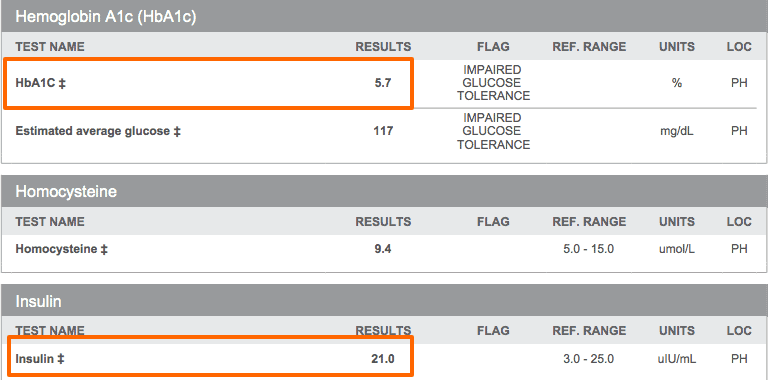
Her Hgb A1c is 5.7 (optimal range is < 5). This result by itself flags her as pre-diabetic and means that she has issues with blood sugar (2).
And, in addition to her elevated Hgb A1c, she also has an elevated fasting insulin of 21 (optimal range is less than 5 while fasting).
The combination of these two tests confirms that she suffers from a condition known as insulin resistance (3).
Most doctors won’t even mention a Hgb A1c that is in the pre-diabetic range because there really aren’t medications designed to treat this issue even though it’s a big deal.
High levels of insulin tell your body to store extra calories as fat and they inhibit a hormone called hormone-sensitive lipase (4).
When insulin is high, fat burn will be almost non-existent because of this enzyme.
What does this mean for you?
Attempts to lose weight will NOT work unless you can lower your insulin levels (we will talk about that below).
And this wasn’t even her biggest issue:
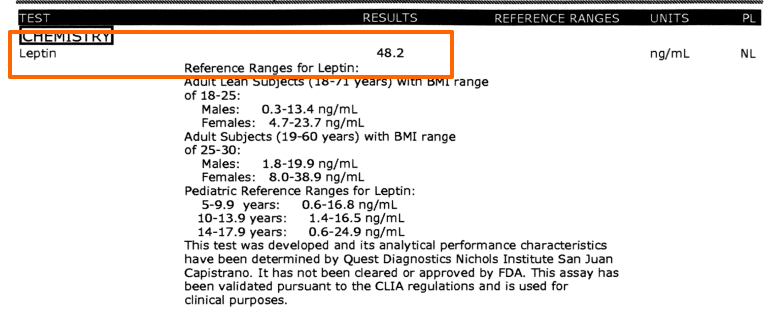
You can see that her fasting leptin level is 48.2 which is VERY high.
Leptin is a hormone secreted by fat cells designed to communicate with the brain. Excessively high levels of leptin in obesity indicate a condition known as leptin resistance (5).
Normal leptin levels should be < 10.
So this leptin is almost 5 times higher than it should be, and along with insulin resistance will make weight loss very difficult.
Now we have 3 big hormone problems that Kathy is dealing with:
- #1. Hypothyroidism
- #2. Insulin Resistance
- #3. Leptin Resistance
But she also presented with several nutrient deficiencies that were also contributing to her low energy levels:

Her serum level of Vitamin B12 was 576 with a reference range of 211-911 (Generally I like to see Vitamin B12 > 1,000).
Her Vitamin D level was 30.1 with a reference range of 30-100 (optimal range 50-60).
Ok, so now that we know what the issue is we can work on a treatment plan that addresses ALL of these issues that will allow her body to lose weight.
This is only a small portion of her tests, by the way, the entire lab report is 8+ pages but I only included some of her results for this discussion.
Getting on the Right Type of Thyroid Medication
Patients with hypothyroidism are always trying to optimize their thyroid medications to impact their weight.
They often ask something like this:
Will switching to T3-containing medications (Like NDT or Cytomel) help me lose weight?
While it is true that hypothyroidism causes your metabolism to slow down (6), the majority of the problem comes from the effects of thyroid hormone on other hormones in your body.
So yes, hypothyroidism does cause weight gain – but only about 10-15 pounds.
That means switching from levothyroxine to Naturethroid or WP thyroid will usually cause some weight loss, just not a ton.
The real benefit of adding T3-containing medications to your regimen comes from the added increase in energy and metabolism.
Adding thyroid hormone helps your body get into “fat-burning mode” and helps with weight loss in general.
In my experience, most patients do feel much better on Natural Desiccated thyroid hormone or T4/T3 combinations like levothyroxine plus Cytomel.
So I don’t want to downplay the importance of getting on the right type and dose of thyroid medication, but I also don’t want you to think that this will be the “cure” you are looking for.
In the case of Kathy, she wasn’t on any thyroid medication (despite obviously suffering from hypothyroidism) so adding on some thyroid medication boosted her energy levels, and weight loss efforts and cleared up her brain fog tremendously.
For more information about thyroid medications and how to find the best one for you please see these links:
In this particular case, I used a combination of NDT (Naturethroid) and liothyronine together.
I’ve found this combo to work quite well because many patients need more T3 than what is already found in NDT.
The Role of Temporary Medications to Balance Hormones and Help with Weight Loss
I also want to talk about how to use temporary medications that can help boost weight loss results by influencing hormone levels.
Many patients tend to freak out a little bit when I talk about adding medications because they are afraid of being on extra medications forever.
And I understand the apprehension.
But when it comes to conditions like insulin resistance AND leptin resistance (especially if you have both at once) it can be VERY difficult to treat them “naturally”.
The addition of temporary medications can help lower both insulin and leptin levels while simultaneously augmenting weight loss and bringing other hormones back into balance.
Let’s talk about insulin resistance as an example:
High insulin can cause high or low testosterone levels, high estrogen levels, and low progesterone levels and make thyroid function worse.
In this case, it makes sense to help reverse the insulin resistance faster to promote more weight loss and bring other hormones back into balance.
This can be accomplished through the use of GLP-1 agonist medications.
Medications in this class include Byetta, Victoza, and Bydureon.
These medications were originally intended to be used in patients with Type II Diabetes (7) but are extremely potent in lowering insulin and leptin levels and promoting weight loss.
Studies show (8) that using them in non-diabetic, obese women can result in significant weight loss (through the mechanism discussed above).
I’ve found these medications to be great if used temporarily and if used with other treatments.
A new drug, known as Saxenda, has recently been FDA-approved for weight loss (9) which indicates that people are catching on to how effective this class of medication can be.
In Kathy’s case, we added Byetta after she had lost 20 pounds and had reached a plateau.
The addition of Byetta allowed her to drop another 17 pounds over 4 weeks.
I prefer to use these medications only as a last resort to help break through plateaus.
By using them in this way you can prevent using them long-term and you should be able to maintain your weight after you stop using them.
The Treatment Plan that Puts it All Together
So how exactly was Kathy able to lose 42 pounds in 3 months?
Let me go over her exact treatment.
But first, take a look at her ‘after’ labs:
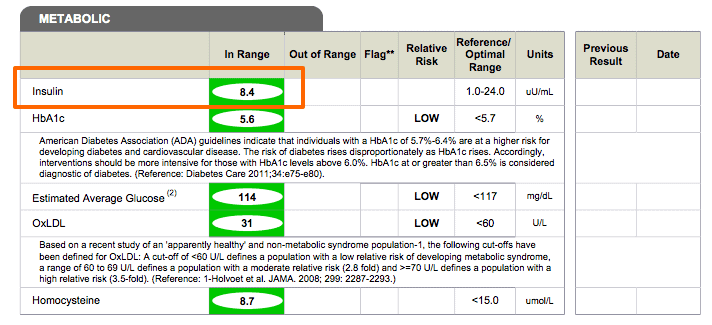
You can see her most recent fasting insulin levels came back at 8.4 (which is down from 21 when we first started).
That drop in fasting insulin is a huge drop and probably one of the main reasons she was able to get that amount of weight off so quickly.
So how did we do it?
Treatment plan:
- Medications: Byetta
- Hormone therapy: NDT + Cytomel
- Supplements: probiotics, protein powder, vitamin B12, vitamin D3, fish oil, berberine, and adrenal support
- Detox: FAR IR Sauna plus Whole body vibration therapy weekly
- Exercise: 30 minutes of walking daily
- Stress Reduction: Meditation
Most patients and doctors may believe that adding NDT or simply changing thyroid medication (or increasing the dose) will lead to the desired results but I’m here to tell you that that rarely works.
Instead, you need a combination of therapies all designed to treat the major issues present in the body.
This generally means a combination of hormone-balancing treatments, changes in diet, the addition of medications if necessary, and of course lifestyle changes.
Using this approach helped Kathy to lose weight and start feeling better.
After 3 months she lost 42 pounds (with some tweaking of her regimen), her energy levels increased to 8/10 and her brain fog is 75% improved from baseline.
She has a goal to lose another 20 pounds and she is on track to hit that goal within a couple of months.
If you are interested in getting results like Kathy then you need to make sure that you are also utilizing a comprehensive treatment plan.
The reason I wanted you to compare your treatment to hers was to give you an idea of what is necessary to get where you want to be.
Bottom line:
By focusing on her MAIN problems (insulin, leptin, and thyroid hormone) we were able to significantly reduce her symptoms and help her lose 42 pounds in 3 months.
Don’t Forget Nutrients and Supplements to Boost Results
A quick word about supplements and treatment:
Make sure you don’t fall into the trap that supplements will be the quick and easy answer to your problem.
Supplements and nutrients can definitely help, but I recommend that you target them to YOUR body and YOUR needs.
I recommend basing supplement choices on laboratory results whenever possible (sometimes clinical symptoms are appropriate as well).
In this specific case, I wanted to go over why I used each supplement:
- Adrenal support: To help energy levels and nourish adrenal function (based on subjective symptoms)
- Probiotics: To help normalize gut bacteria, beat cravings, and help promote metabolism.
- Protein Powder: To help provide nutrition and basic vitamins, and promote satiety.
- Vitamin B12: She was deficient and replacing B12 helped improve both her memory and her energy levels. I prefer the use of injections but oral B12 supplements can work as well.
- Vitamin D3 + Vitamin K2: To replace deficiencies and promote proper calcium regulation in the body.
- Berberine + Alpha Lipoic Acid: Both are designed to help treat insulin resistance and lower blood sugar levels (to help with weight loss)
- Fish oil: To help balance the omega 3:6 ratio and reduce inflammation
Supplements can help BOOST results but if your leptin levels are as high as what was depicted in this case study it is unlikely that supplements by themselves will be enough to treat the problem.
That’s generally why I consider supplements as only a part of an overall treatment plan.
Do you Have Questions About this Case Study?
If you haven’t already I would encourage you to check out my 60-day weight loss guide and supplement bundle.
That program contains many of the meal plans, exercise routines, supplements, and fasting protocols that Kathy used to lose weight. It also includes private videos designed to help you get on the right track with your medications if necessary.
To recap:
Significant weight loss and symptomatic improvement are possible in hypothyroid patients – it just takes the right approach to treatment and management.
If you are seeing a provider that is ignoring your Hormones as a cause of your symptoms (or is unwilling to at least look into them) then you may want to seek out another provider.
I’ve created a resource that you can use here designed to help you find a doctor to help.
Now it’s your turn:
Do you have any questions about this case study?
Have you been able to successfully lose weight and keep it off?
Are your hormones optimized?
What is holding you back from getting your desired results?
Leave your questions or comments below!
Scientific References
#1. https://www.ncbi.nlm.nih.gov/pmc/articles/PMC3943438/
#2. https://www.ncbi.nlm.nih.gov/pmc/articles/PMC2999978/
#3. https://www.ncbi.nlm.nih.gov/pmc/articles/PMC1204764/
#4. https://www.ncbi.nlm.nih.gov/pmc/articles/PMC333098/
#5. https://www.ncbi.nlm.nih.gov/pubmed/17937601
#6. https://www.ncbi.nlm.nih.gov/pmc/articles/PMC4044302/
#7. https://www.ncbi.nlm.nih.gov/pubmed/25382096
#8. http://www.ncbi.nlm.nih.gov/pmc/articles/PMC3241299/
#9. https://www.ncbi.nlm.nih.gov/pmc/articles/PMC5358074/
